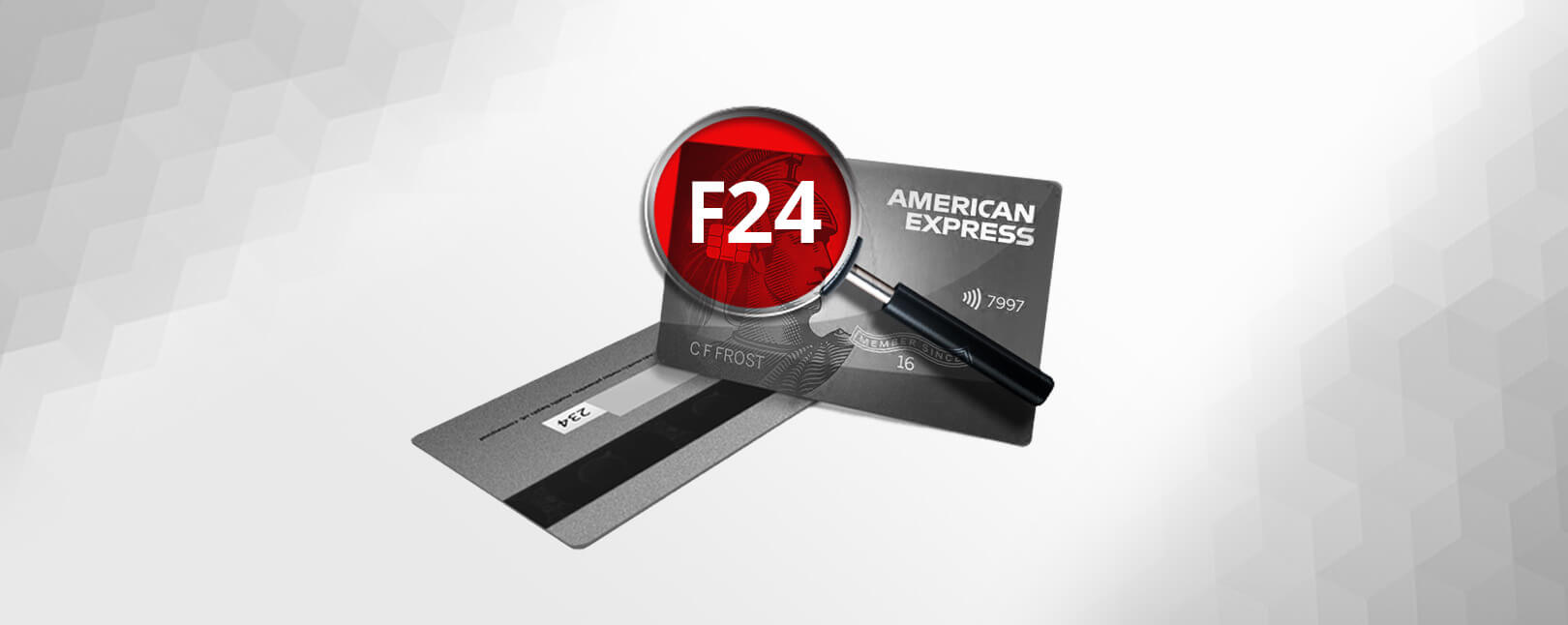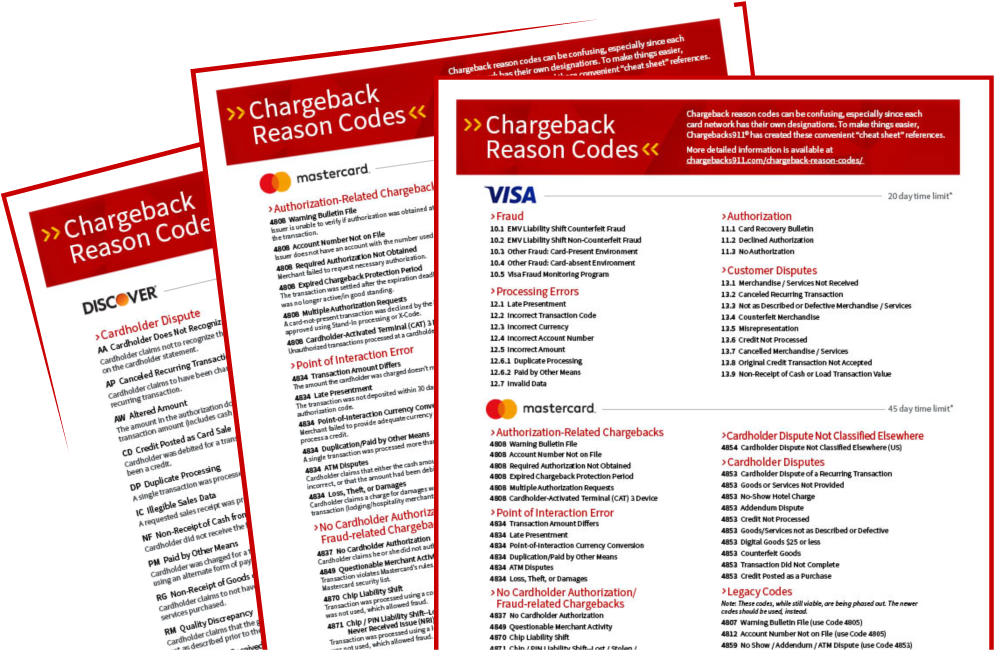
How to Handle Amex Reason Code F24 Chargebacks
American Express breaks down the acceptable causes for a customer to dispute a credit card transaction in their dispute guidelines. This is done for the sake of simplicity and standardization.
Each chargeback trigger has a designated “reason code.” Amex can then assign the appropriate code to each case to show the given reason for the chargeback.
Learn more about Amex reason codes
Today, we’re looking at one reason code in particular — F24 — and exploring the causes, timeframes, fees, and other specifics. We’ll also explore what you can do to prevent these chargebacks from happening.
Recommended reading
- What is Compelling Evidence? Examples & Tips to Win Disputes
- Chargeback Stats: All the Key Dispute Data Points for 2025
- What Happens When You Dispute a Transaction?
- Monica Eaton Named a Finalist for ‘CEO of the Year’!
- Chargebacks911® Honored for “Scary Good” Show Presence!
- PayPal Scam Emails: How They Work | How to Identify & Avoid
What is American Express Reason Code F24?
American Express chargeback reason code F24 is “No Card Member Authorization.” This reason code is used to explain that, like the title implies, you submitted a transaction to the bank for processing. However, you the cardholder did not give their authorization to charge their account.
This can happen for a few different reasons. For example, the person who made the purchase in question might’ve been an impostor; a scammer might use stolen cardholder information to make a purchase on your site. Then, when the buyer noticed the purchase, they file a chargeback.
In the example above, the cardholder is the victim of fraud. However, you are the one who gets stuck holding the bag, because you failed to detect the unauthorized card use
What Caused This Dispute?
Amex Chargeback Reason Code F24 is primarily issued when a cardholder claims a transaction was not authorized To demonstrate, this scenario can arise if:

How to Respond to Amex Reason Code F24 Chargebacks
So, what happens if you can prove that your customer did, in fact, authorize the purchase being challenged?
Naturally, if you get an Amex F24 chargeback, you’ll need to resolve the issue asap. But, let’s say you have a strong suspicion that the chargeback was filed without a valid reason for a dispute. If that’s the case, you should file a dispute response. This is done through a process called representment.
Representment means you literally “re-present” the charge to the bank. It’s the process developed specifically to let you fight invalid chargeback claims.
You can’t just resubmit the same transaction data, though; like they say “insanity is doing the same thing over and over again and expecting different results.” This time, you have to provide evidence to the card issuer (in this case, American Express) that the transaction was legit, and that it was in line with all the card issuer's policies.
This is crucial though: remember the time limit.
There’s a strict time limit to consider here. You have just 20 days in which to submit your response to American Express. However, this time frame also includes the time it took for your acquirer to get the dispute notification to you, as well as time spent by the acquirer reviewing and submitting your case. In a real sense, you probably only have five days or less to prepare and submit your response.
Acceptable Evidence for Amex Reason Code F24 Responses
Think you’ve got a good case? Good. That means you can re-represent the transaction… under the condition that you have solid evidence, of course.
For American Express reason code F24 chargebacks, you’ll need to produce documentation that proves you had a valid authorization from the cardholder. Documents that could work here include:
- A positive address verification match
- A positive American Experess SafeKey match
- Documentation from a similar purchase by the same customer which was not challenged
Those are just a few pieces of admissible evidence. Fighting with disputes filed under this reason code can be especially tricky, though. In their guideline, American Express doesn’t even list admissible evidence for these disputes. The only “official” option is to offer proof that you already provided a credit to offset the amount charged as a way of trying to avoid the dispute.
For reason code F24 chargebacks, your best option is going to be to try and prevent them wherever possible.
How to Prevent Amex Reason Code F24 Chargebacks
As the old adage goes, “an ounce of prevention is worth a pound of cure.”
You may never be able to stop chargebacks entirely. But, you can limit your exposure to risk and keep your chargeback ratio in good standing by adopting a few best practices. You’re going to want to:
#1 | Optimize Your Descriptors
Your billing descriptor is the indicator that shows up on your customers’ credit card statements. Ensure that it includes your “doing business as” (or “DBA”) name, as well as your website. This will help cardholders identify charges.
#2 | Include a Phone Number
Adding your customer service contact number to your billing descriptor means that customers can contact you directly to ask about purchases (rather than calling the bank to file a chargeback).
#3 | Add Special Conditions
If there’s a special condition that applies — for example, a “no show” charge” or an installment number — make sure that these show up in the charge descriptor. That way, the buyer doesn’t assume they’re being double-charged.
Take a Wider View
You can dispute invalid chargebacks from Amex reason code F24. However, it’s much more efficient to take a proactive stance. The same is true of the other chargeback reason codes, as well. A truly effective chargeback management strategy must encompass prevention as well as disputing cases of friendly fraud.
Chargebacks911® can help your business manage all aspects of chargeback reason codes, with proprietary technologies and experience-based expertise. Contact us today for a free ROI analysis to learn how much more you could save.
FAQs
Does Amex investigate chargebacks?
Yes. American Express investigates chargebacks by reviewing the evidence provided by both the merchant and the cardholder to determine the legitimacy of the transaction and decide on the chargeback claim. This process ensures a fair resolution based on the documentation and arguments presented by both parties.
What is the reason code for a chargeback on American Express card?
An American Express chargeback reason code is a code that identifies the specific reason a cardholder or issuing bank has disputed a transaction, guiding the merchant on the nature of the dispute and what evidence may be required to contest it. Each code corresponds to a particular issue, such as unauthorized use, processing errors, or non-receipt of goods or services. Click here to see a full list of Amex reason codes.
Do police investigate chargebacks?
Police typically do not investigate chargebacks as they are considered a dispute between the merchant and the cardholder, handled through the card issuer's internal processes. However, if fraud is suspected as the cause of a chargeback, law enforcement may be involved in investigating the fraudulent activities.
How successful are Amex disputes?
The success of an American Express dispute depends on the merchant's ability to provide compelling evidence that the transaction was valid and in accordance with Amex policies. Success rates vary widely based on the nature of the dispute and the quality of the documentation provided by the merchant.
How does American Express investigate disputes?
American Express investigates disputes by reviewing documentation and evidence provided by both the cardholder and the merchant, such as transaction receipts, proof of delivery, or communication records, to determine the validity of the chargeback claim. This process aims to ensure a fair resolution based on the facts presented by both parties.









